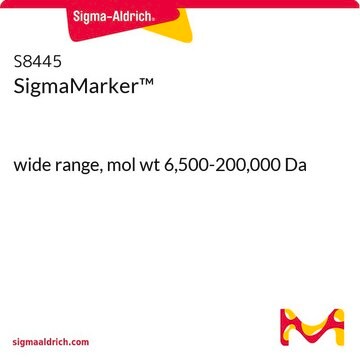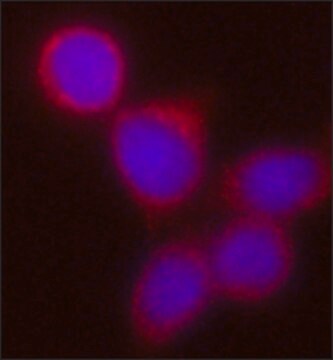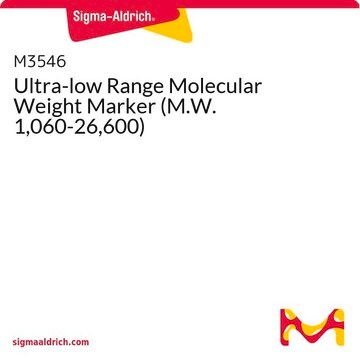94964
BLUeye Prestained Protein Ladder
room temperature stable molecular weight markers
Synonym(s):
protein markers, protein molecular weight markers, protein standards
Sign Into View Organizational & Contract Pricing
All Photos(1)
About This Item
UNSPSC Code:
23201100
NACRES:
NA.32
Recommended Products
Related Categories
General description
The ready-to-use BLUeye prestained protein ladder has 12 sharp bands at 11, 17, 20, 25, 35,48, 63, 75, 100, 135, 180, and 245 kDa, which has more bands than commonly used markers. The BLUeye prestained protein ladder is provided in a gel loading buffer. A green and a red reference band, respectively, enable easier identification. The BLUeye prestained protein ladder was produced by GeneDirex, Taiwan.
Application
BLUeye Prestained Protein Ladder has been used for used protein detection by Western blotting.
Storage Class Code
10 - Combustible liquids
WGK
WGK 2
Flash Point(F)
Not applicable
Flash Point(C)
Not applicable
Choose from one of the most recent versions:
Already Own This Product?
Find documentation for the products that you have recently purchased in the Document Library.
Customers Also Viewed
Julita Pietrzak et al.
Biochimica et biophysica acta. Gene regulatory mechanisms, 1862(2), 198-208 (2018-11-12)
Differentiation of human macrophages predisposes these cells to numerous tasks, i.e. killing invading pathogens, and this entails the need for enhanced intracellular defences against stress, including conditions that may increase DNA damage. Our study shows that expression of DNA repair
Evaluation of Toxic Effect of Copper and Cadmium on Growth, Physiological Traits and Protein Profile of Wheat (Triticum aestivium L.), Maize (Zea mays L.) and sorghum (Sorghum bicolor L.).
Metwali, E. M.R., et al.
World Applied Sciences Journal , 21, 301-314 (2013)
Appraisal of biochemical and genetic diversity of mango cultivars using molecular markers.
Abou-Ellail, M., et al.
African Journal of Biotechnology, 13, 2796-2806 (2014)
Mohammad S Eram et al.
Archaea (Vancouver, B.C.), 2014, 349379-349379 (2014-07-02)
The hyperthermophilic archaeon Thermococcus guaymasensis produces ethanol as a metabolic end product, and an alcohol dehydrogenase (ADH) catalyzing the reduction of acetaldehyde to ethanol has been purified and characterized. However, the enzyme catalyzing the formation of acetaldehyde has not been
Zsolt Regdon et al.
Free radical biology & medicine, 131, 184-196 (2018-12-07)
In inflamed tissues or during ischemia-reperfusion episodes, activated macrophages produce large amounts of reactive species and are, thus, exposed to the damaging effects of reactive species. Here, our goal was to investigate the mechanism whereby activated macrophages protect themselves from
Protocols
Protocol for sample preparation for cell lysis and efficient protein extraction from cultured tissues and cells for subsequent Western blotting.
Our team of scientists has experience in all areas of research including Life Science, Material Science, Chemical Synthesis, Chromatography, Analytical and many others.
Contact Technical Service










